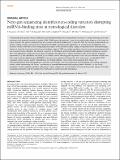Files in this item
Next-gen sequencing identifies non-coding variation disrupting miRNA-binding sites in neurological disorders
Item metadata
| dc.contributor.author | Devanna, P | |
| dc.contributor.author | Chen, X S | |
| dc.contributor.author | Ho, J | |
| dc.contributor.author | Gajewski, D | |
| dc.contributor.author | Smith, S D | |
| dc.contributor.author | Gialluisi, A | |
| dc.contributor.author | Francks, C | |
| dc.contributor.author | Fisher, S E | |
| dc.contributor.author | Newbury, D F | |
| dc.contributor.author | Vernes, S C | |
| dc.date.accessioned | 2021-03-24T12:30:04Z | |
| dc.date.available | 2021-03-24T12:30:04Z | |
| dc.date.issued | 2018-05 | |
| dc.identifier | 272111992 | |
| dc.identifier | aa670f8e-f82e-4dc8-bea3-fc5c19946536 | |
| dc.identifier | 28289279 | |
| dc.identifier | 85015084189 | |
| dc.identifier.citation | Devanna , P , Chen , X S , Ho , J , Gajewski , D , Smith , S D , Gialluisi , A , Francks , C , Fisher , S E , Newbury , D F & Vernes , S C 2018 , ' Next-gen sequencing identifies non-coding variation disrupting miRNA-binding sites in neurological disorders ' , Molecular Psychiatry , vol. 23 , no. 5 , pp. 1375-1384 . https://doi.org/10.1038/mp.2017.30 | en |
| dc.identifier.issn | 1359-4184 | |
| dc.identifier.other | PubMedCentral: PMC5474318 | |
| dc.identifier.other | ORCID: /0000-0003-0305-4584/work/86538513 | |
| dc.identifier.uri | https://hdl.handle.net/10023/21699 | |
| dc.description | Funding: This work was funded by a Marie Curie Career Integration Grant and by a Max Planck Research Group Grant both awarded to SCV. The work of the Newbury lab is funded by the Medical Research Council (G1000569/1 and MR/J003719/1). XSC, AG, CF and SEF were supported by the Max Planck Society. The UK Medical Research Council and the Wellcome Trust (Grant ref: 102215/2/13/2) and the University of Bristol provided core support for ALSPAC. The work of the Wellcome Trust Centre in Oxford is supported by the Wellcome Trust (090532/Z/09/Z). JH was supported by a scholarship from the Agency for Science, Technology, and Research, Singapore. The work of SDS is supported by the grant HD027802 from NIH. | en |
| dc.description.abstract | Understanding the genetic factors underlying neurodevelopmental and neuropsychiatric disorders is a major challenge given their prevalence and potential severity for quality of life. While large-scale genomic screens have made major advances in this area, for many disorders the genetic underpinnings are complex and poorly understood. To date the field has focused predominantly on protein coding variation, but given the importance of tightly controlled gene expression for normal brain development and disorder, variation that affects non-coding regulatory regions of the genome is likely to play an important role in these phenotypes. Herein we show the importance of 3 prime untranslated region (3'UTR) non-coding regulatory variants across neurodevelopmental and neuropsychiatric disorders. We devised a pipeline for identifying and functionally validating putatively pathogenic variants from next generation sequencing (NGS) data. We applied this pipeline to a cohort of children with severe specific language impairment (SLI) and identified a functional, SLI-associated variant affecting gene regulation in cells and post-mortem human brain. This variant and the affected gene (ARHGEF39) represent new putative risk factors for SLI. Furthermore, we identified 3'UTR regulatory variants across autism, schizophrenia and bipolar disorder NGS cohorts demonstrating their impact on neurodevelopmental and neuropsychiatric disorders. Our findings show the importance of investigating non-coding regulatory variants when determining risk factors contributing to neurodevelopmental and neuropsychiatric disorders. In the future, integration of such regulatory variation with protein coding changes will be essential for uncovering the genetic causes of complex neurological disorders and the fundamental mechanisms underlying health and disease. | |
| dc.format.extent | 10 | |
| dc.format.extent | 2591085 | |
| dc.language.iso | eng | |
| dc.relation.ispartof | Molecular Psychiatry | en |
| dc.subject | 3' Untranslated Regions/genetics | en |
| dc.subject | Adult | en |
| dc.subject | Autistic disorder/genetics | en |
| dc.subject | Binding sites/genetics | en |
| dc.subject | Bipolar disorder/genetics | en |
| dc.subject | Child | en |
| dc.subject | Cohort studies | en |
| dc.subject | DNA, intergenic/genetics | en |
| dc.subject | Female | en |
| dc.subject | Gene expression regulation/genetics | en |
| dc.subject | Genetic predisposition to Disease | en |
| dc.subject | Genetic variation/genetics | en |
| dc.subject | Genomics | en |
| dc.subject | High-throughput nucleotide sequencing/methods | en |
| dc.subject | Humans | en |
| dc.subject | Language development disorders/genetics | en |
| dc.subject | Male | en |
| dc.subject | Mental disorders/genetics | en |
| dc.subject | microRNAs/genetics | en |
| dc.subject | Nervous system diseases/genetics | en |
| dc.subject | Neurodevelopmental disorders/genetics | en |
| dc.subject | Schizophrenia/genetics | en |
| dc.subject | Sequence analysis/methods | en |
| dc.subject | QH301 Biology | en |
| dc.subject | QH426 Genetics | en |
| dc.subject | RC0321 Neuroscience. Biological psychiatry. Neuropsychiatry | en |
| dc.subject | DAS | en |
| dc.subject | SDG 3 - Good Health and Well-being | en |
| dc.subject.lcc | QH301 | en |
| dc.subject.lcc | QH426 | en |
| dc.subject.lcc | RC0321 | en |
| dc.title | Next-gen sequencing identifies non-coding variation disrupting miRNA-binding sites in neurological disorders | en |
| dc.type | Journal article | en |
| dc.contributor.institution | University of St Andrews. School of Biology | en |
| dc.identifier.doi | https://doi.org/10.1038/mp.2017.30 | |
| dc.description.status | Peer reviewed | en |
This item appears in the following Collection(s)
Items in the St Andrews Research Repository are protected by copyright, with all rights reserved, unless otherwise indicated.

